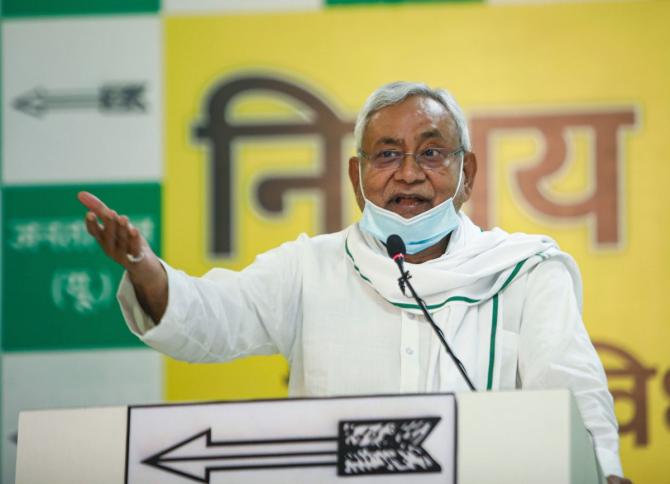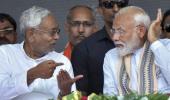Left behind after election will be the Biharis with their stagnant conditions of poor education, poor health infrastructure, poverty, unemployment, divisions in society and the the aftermath of coronavirus.
What will remain is the Bihari tenacity, observes Asmita Bihari.

My home state Bihar boasts the unpopular moniker 'Pravasi Bihari' because of the massive and continued exodus of Biharis out of the state.
Each year, thousands and thousands of Biharis move out of Bihar to the metros and other states in search of better education and employment.
Bihar, which normally does not seem alluring to outsiders, be it for business or pleasure, has suddenly become this huge attraction for political tourists.
Also returning to Bihar are a group of non-resident Biharis, who include MPs and MLAs representing constituencies in Parliament and the state assembly.
This includes the Leader of the Opposition, who returned to Bihar from New Delhi only in mid May.
As for his elder brother -- Tej Pratap Yadav has mostly spent time in Mathura and Vrindavan.
Also returning to Bihar are Ravi Shankar Prasad and Rajiv Pratap Rudy.
Prasad, of course, is busy in New Delhi, with his onerous multiple ministerial responsibilities.
As for Rudy, he has neither been vocal or visible since he was dropped as a minister in August 2017, though he won re-election from the Saran Lok Sabha seat in May 2019.
Everyone -- prodigal and pravasi -- flaunt their Bihari lineage, of course.
Then there are the migrant Biharis who were forced to return to the state to survive the harshest lockdown in the Republic's history.
Many, who were fortunate to have retained their employment, have gone back to the cities from where they fled in March and April.
The ruling alliance would be happy to see the back of these returning migrants.
Nitish Kumar, in one of his speeches, mentioned that he does not like the word 'migrant', as these workers are still within the country albeit in a different state.
Well, if you ask these migrants, who somehow got back on their own, to their homes, without any help from the Bihar government, the feeling would be mutual, Mr chief minister.
Each one would remember their horrific ordeals and probably disinclined to press the ballot button on the arrow or the lotus.
Bihar is also attracting political parties, both new and old.
Parties throw their hats into the ring each day as we get closer to the three phase election.
The Jharkhand Mukti Morcha, fresh from its victory in the neighbouring state in December 2019, has been emboldened to spread its wings into Bihar.
Jharkhand Chief Minister Hemant Soren's party will contest 7 seats after having been jilted by the Rashtriya Janata Dal-led Mahagathbandhan, which the JMM was a part of earlier.
The latest and surprising entrant is the Shiv Sena, which has announced it will field 50 (ahem) candidates!
No doubt, a decision provoked by the Maharashtra-Bihar police tussle in the Sushant Singh Rajput death case.
Suddenly, the actor's death, the source of much fear and loathing on some 'news' television channels, is no longer an election hot button, sidelined by it exhausting its best-use-by early political utility.
Mayawati, who maintained a mysterious silence on the Hathras tragedy involving a young Dalit woman, has announced a Bahujan Samaj Party coalition with Upendra Kushwaha's Rashtriya Lok Samta Party.
The perennial vote splitter in recent elections -- the All India Majlis-e-Ittehad-ul-Muslimeen -- has also tied up with Kushwaha's RLSP.
Hyderabad MP Asaduddin Owaisi wants to project his AIMIM party as the sole electoral representative of Muslims in Bihar, who constitute 17% of the state's population.
The Muslims were jilted as they voted for the Mahagathbandhan -- then constituted by the RJD + Janata Dal-United + Congress -- in the November 2015 assembly election, only to watch Nitish Kumar and the JD-U break away months away and form a government with the Bharatiya Janata Party.
Muslims, along with the Yadavs, form the core of the RJD's vote base and it appears that the AIMIM may only win a few seats in Muslim dominated Kishanganj and Seemanchal.
The luckiest winner amongst the political newbies is the Vikassheel Insan Party, led by Bollywood art director turned politician Mukesh Sahni. The BJP has conceded 11 seats to the VIP from its share of 121, surely a big step in reaching out to Sahni's Mallah fishermen community.
Sahni had wanted the RJD to give him 25 seats and an assurance of the deputy chief minister's post if the Mahagathbandan won the election, a demand which RJD leader Tejashwi scorned, leading the VIP leader to pitch his case to ther BJP.
The visiting faculty of leaders will leave before Diwali when a new government is in place in Patna.
After celebrating Chhath at home, a fresh batch of Bihari students will head to the national capital and elsewhere to study.
What will remain is the status quo.
Left behind will be the Biharis with their stagnant conditions of poor education, poor health infrastructure, poverty, unemployment, divisions in society and the aftermath of coronavirus.
What will remain is the Bihari tenacity.
Asmita Bihari is a non resident Bihari.
Feature Presentation: Aslam Hunani/Rediff.com











 © 2025
© 2025